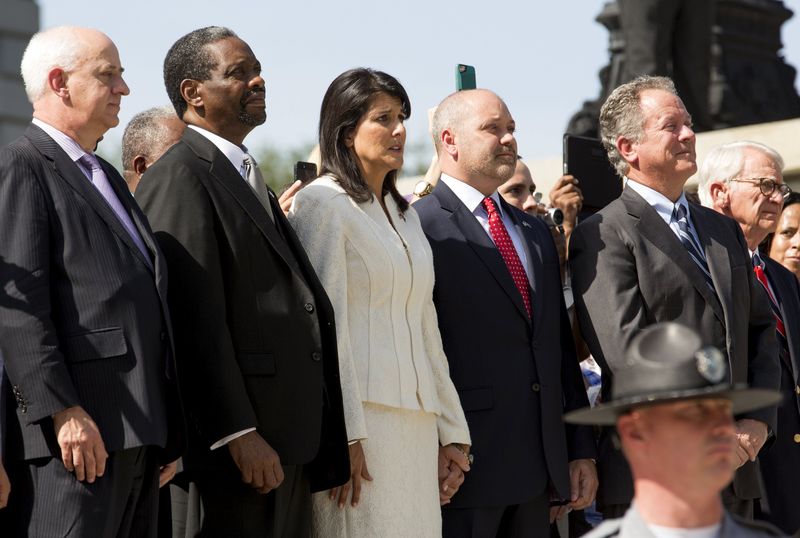By Harriet McLeod
COLUMBIA, S.C. (Reuters) - South Carolina on Friday removed the Confederate battle flag from the state capitol grounds in a joyous but solemn ceremony that relegated a divisive symbol of the South's pro-slavery legacy to a museum.
The Civil War flag, which had flown at the State House for 54 years, came down less than a month after a white gunman killed nine black men and women in a historic Charleston church.
In Washington, the Federal Bureau of Investigation said on Friday that the man charged in the massacre, Dylann Roof, was erroneously able to buy a gun due to a mix-up in a federal background check.
On the State House grounds, an honor guard of black and white state troopers ceremonially lowered the flag and folded it to be taken to a nearby museum. Several thousand onlookers chanted "U-S-A, U-S-A" and broke out singing a refrain from a late 1960s pop song, "Na na, na na na, hey hey, goodbye."
While the flag is a hated symbol of slavery and racism to many, it is an emblem of Southern pride and heritage for others.
The banner, a replica of the flag of General Robert E. Lee's Army of Northern Virginia, was moved to the "relic room" of a state-run military museum in Columbia, South Carolina's capital. It will be stored there while an exhibit is prepared.
The rebel standard will be displayed alongside other flags and artifacts carried by Southern Confederate soldiers 150 years ago in the Civil War.
President Barack Obama, the United States' first black president, tweeted, "South Carolina taking down the confederate flag - a signal of good will and healing, and a meaningful step towards a better future."
The state legislature passed a bill ordering the flag's relocation on Thursday by a wide majority after three days of tense debate.
The 21-year-old suspect in the June 17 killings at the Emanuel African Methodist Episcopal Church, Dylann Roof, appeared in photos posing with a Confederate battle flag that surfaced on a website bearing a racist manifesto. That image spurred politicians and national retailers to pull it from display.
FBI Director James Comey said on Friday that Roof was only able to purchase a gun in April because of the background check mix-up.
The examiner conducting the check did not see a police report in which Roof admitted to drug possession, which would have barred the man from buying the weapon, Comey said.
With the flag down, South Carolina can now host championship-level college sports events, National Collegiate Athletic Association President Mark Emmert said on Friday.
Since 2001, the NCAA has prohibited playing pre-determined championships in states where the flag is prominently flown.
South Carolina Republican Governor Nikki Haley, who pushed for the state legislature to enact a law to remove the flag, was among those watching Friday's ceremony from the State House steps.
"I'm thinking of those nine people today," she said, referring to the murder victims in an interview with NBC's "Today" TV show shortly before the flag came down.
Among the slain were Reverend Clementa Pinckney, the Charleston church's pastor and a widely admired state senator.
In South Carolina - the first state to secede from the United States before the 1861-1865 Civil War broke out - this week's debate in the legislature brought an emotional closure for a symbol long dividing the state.
The Confederate battle flag waved atop the capitol from 1961 to 2000, when it was moved to a Confederate war memorial near the building's entrance as a compromise with those who wanted it permanently removed. South Carolina raised the banner over the capitol dome at a time when segregationists were resisting federal efforts to integrate the South.
A black woman, Tenetha Hall of Newberry, South Carolina, said she took Friday off work to drive an hour to Columbia to watch the flag come down.
"My heart is overjoyed. I can feel the togetherness," she said. "I'm so glad my children and six grandchildren will get to see this history."
The head of the Sons of Confederate Veterans, Charles Kelly Barrow, issued a statement on Thursday saying he was "dismayed" by the law's signing, describing it as a "politically convenient insult to the legacy of millions of South Carolinians."
Brighton Lester, 27, of Columbia and his wife, Megan, 24 were at the State House on Friday carrying large Confederate flags on poles. Both are white.
"I came here to show my support for the flag, for the positive side of it," said Brighton Lester.

"I am indifferent on whether it flies at the State House. But I believe people should be educated about history."